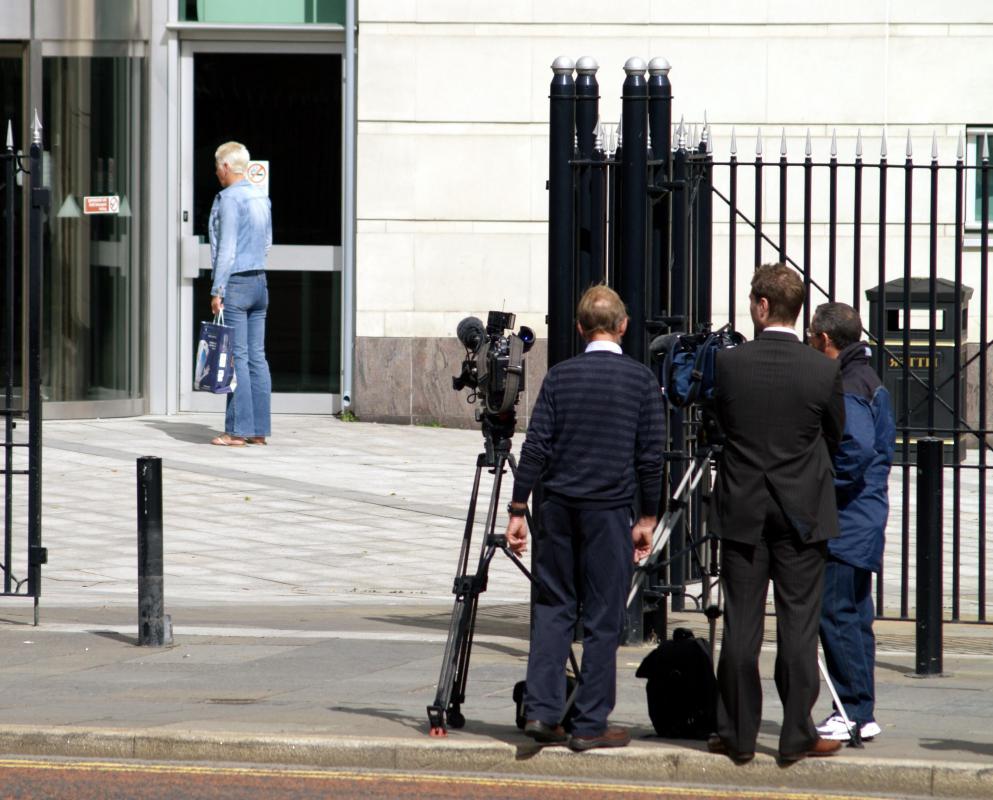At MyLawQuestions, we're committed to delivering accurate, trustworthy information. Our expert-authored content is rigorously fact-checked and sourced from credible authorities. Discover how we uphold the highest standards in providing you with reliable knowledge.
What are Leading Questions?
Leading questions are questions that are framed in a way that evokes a specific response from the individual being questioned. Issues about such questions can come up in journalistic interviews, court rooms, and surveys, and in some cases, the use of such questions is viewed as a breach of ethics and professionalism. Leading questions may also be used in a more casual setting, such as a conversation between friends, relatives, or coworkers.
When a question is leading, the questioner uses language that suggests a particular answer. For example, instead of asking a witness on the stand “where were you on the night of 20th December 1967,” the questioner would say “you were driving to Maine on the night of 20th December 1967, were you not?” The difference between these two examples is quite clear. The first question is open ended, while the second is closed, requiring only a yes or no answer.

Many leading questions are framed as yes or no questions, with the subject of the questions essentially being coached into a specific answer. Others may be open ended, but framed in a way that embeds the information that the questioner wishes to elicit. Yes or no questions are not always leading, but they often are, so they should be constructed carefully.

In a court room, the use of these types of questions is frowned upon, because people believe that they compromise the witness and potentially taint the evidence that he or she provides. Such questions are usually only allowed in very specific situations, such as providing establishing biographical information from a witness when he or she first arrives on the stand. In surveys, leading questions can be very dangerous, because they can be formulated in a way that slants results, and the same holds true for questions used in media interviews.

Some leading questions are assumptive, meaning that the questioner makes an assumption in the process of asking the questions. Others use implications, and some are coercive, designed to strongly suggest the preferred answer. They can also create false links in the mind of the witness, and some psychological studies have shown that using these questions can actually result in the implantation of false memories.

Learning to formulate questions can take time. People who ask questions for a living often receive special training in how to ask them, making people like journalists, psychologists, police officers, and lawyers especially skilled at asking questions well. As a general rule, questions should be asked in a way that invites a person to make a response without being influenced by the attitude of the questioner. For example, a parent talking to a teen who was out late could say “where were you last night,” instead of “you were at a party last night, weren't you?”
AS FEATURED ON:
AS FEATURED ON:















Discussion Comments
Subway11 - I think you are right. I saw a case on television in which a man was wrongly convicted of an attempted robbery.
The victim was showed the picture of the convicted man and told investigators that he was the one that pulled the gun on him despite the fact that he had told investigators that the suspect was 5’10” when the convicted man was actually 6’3”.
His wife was able to get him released because the actual perpetrator was 5’7” tall. I was amazed that someone could be wrongfully convicted like that, but even the victim made a mistake.
The jury was also told about the convicted man’s prior criminal history and although it did not have anything to do with the case at hand, the leading testimony tainted the jury and convicted an innocent man to life in prison.
I know that in the 1970’s a psychologist named Elizabeth Loftus created an eyewitness testimony study.
She had two groups of participants that were shown material that was different than how it was verbally described .
One group was shown a stop sign while a second group was shown a yield sign and a car at a corner.
The other group was shown the same car but this time there was a stop sign. The researchers asked the first group how fast the car was going when it crashed into stop sign.
Although the car was idle in the original picture and the subjects actually saw a yield sign many stated that the car had such an impact that the windshield shattered.
Here the use of the word crashed is in a form of a leading word because it is creating assumptions in the mind of the subjects that are not true.
Loftus stated that people always have preconceived notions when recalling events and the often color in the details which is why leading questions are dangerous because they not only affect the person on the witness stand, but they also affect the jury who is hearing this biased testimony.
Sapphire12 - I agree that it is easy to suggest leading questions but it can be problematic in a trial. There have been numerous psychological studies that have demonstrated the bias in eyewitness testimony and the problem with eyewitness memory in general.
If you add leading questions to the component it is easy to understand how someone could be wrongfully convicted of a crime.
Leading questions are easier to fall into than you might think. I was on a mock trial team for a year, and it was hard to avoid leading questions in a cross examination. However, after awhile you get better at switching it around if people catch you.
Leading questions can be a bad thing in terms of a courtroom setting, getting the questioner into a lot of trouble. On the other hand, they can be very valuable to other people, even if they are not the most neutral thing. It can be helpful for parents or friends to ask people slightly leading questions if trying to find out how someone is really feeling about something upsetting, or where they are going or have been, rather than dancing around a subject, trying to get someone to open up.
Post your comments